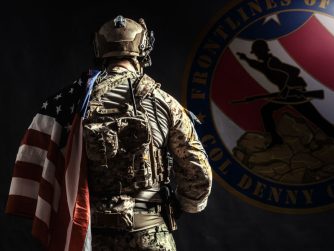Recently, the Military Times published an article about the declining morale in our armed forces. It did and should have hit a big nerve.
A military with poor morale is a military that fights poorly, takes more casualties, and loses fights. I hope this turns out to be a huge wake-up call to our at-fault senior uniformed and civilian military leadership.
I fear that the wrong fixes will be applied to this problem. You know, the easiest problems to fix are the ones based on money. Budget priorities can be shifted to reduce the hit on service members’ pocketbooks–but it’s not primarily the pay and benefit issues that are driving the morale dive.
According to the Military Times, satisfaction with pay and allowances declined from 87% in 2009 to 44% in 2014. Military pay has kept up with inflation and then some for the past several years. Now, I’m not suggesting that military pay is somehow too high, but it compares favorably with the civilian sector.
That said, 2015’s pay increase is falling slightly below inflation and the housing allowance has changed. All that said, pay and allowances are still pretty good.
The non-money military benefits, like health care, commissaries, exchanges, and recreation facilities, may have had some small changes. Some are for the worse, like commissary surcharges; others are better.
These things are a minor impact on morale, at best.
And, generally, it’s not the deployment schedules, either, at least not any more. Yes, some units still have intensive deployment schedules. On an individual basis, some service members also have very high operational tempos. But on the whole, the pace of deployments has declined significantly since the days of the Iraq surge.
Just a few years ago, leaders were properly worried that the pace of deployments would seriously damage morale. Now that deployments have decreased, the worry is that morale is suffering for, yes, lack of a mission. Service members complain about deployments, but they also complain when they don’t deploy. Deployments are a factor in poor morale, but they aren’t key in today’s military morale challenge, either.
The key factor is, duh, senior leadership that has not kept faith with its troops. Today’s troops feel abandoned by their senior leadership who seem to be primarily focused on looking good to their civilian leaders—not taking care of the troops. Our soldiers, sailors, airmen, and marines feel used and abused for no practical or tactical purpose.
Even though we’ve abandoned all of our successes in Iraq and Afghanistan, our military requirements to keep our nation safe are quite significant—you know, the activities of Russia, Iran, China, and North Korea for example– and the size of our current military is really inadequate to deal with these threats—and of all people, our troops know that.
Today our military is critically short in personnel, equipment, and training. Units have to swap equipment to train or deploy; new personnel go forward with inadequate training. Pilots don’t get enough flight time to maintain proficiency—and more and more. The military is like a subsistence farmer who’s eating his seed corn — it works for a while, but not for long.
Service members aren’t blind to this. Those who’ve been around can sense that they are working harder, but accomplishing less. There’s more work, like political correctness classes, but somehow less mission training. And perhaps they could deal with the extra work. They did join to serve, after all. They just don’t feel as if their loyalty to our military and our nation is appreciated or recognized. They see clearly foolish decisions shaping their future.
From the Army giving pink slips to soldiers in Afghanistan, the Marines kicking out sergeants at ten years of service, to the Air Force enticing airman to apply for voluntary separation incentives and then revoking the offer, senior leadership has been making its mission pleasing Washington at the expense of the troops who trust them.
Then there’s the decision to force our military to place women in infantry, armor, and special ops forces—do you really think that our most valuable warriors, our Navy SEALs, Army Rangers, infantrymen and the like don’t know that women will not help their combat readiness—but will make all of them more vulnerable to the enemy? Those warriors know a losing situation when they see it.
Bottom line, this is seen as senior leaders so cowed by civilian authority that they will throw anyone under a bus to preserve their image of the military. Guess what this does to the warrior spirit—the band-of-brothers syndrome that has made our military so effective over the years? Yeah, it goes in the trash.
Life in the military has a lot of rewards as well as a lot of sacrifices. What has made our troops withstand those hardships is a sense of belonging and the knowledge that someone has their backs. The source of the military’s morale issues is not money based. It’s because many troops believe that loyalty currently only travels up, not down–as it should.
The generals and admirals can complain about not having the money to fix the morale problem–but there’s not enough money in the world to fix it until and unless the leadership lack is resolved. If our brass doesn’t have its peoples’ backs, it will soon be looking at their backs as they walk out the door.



